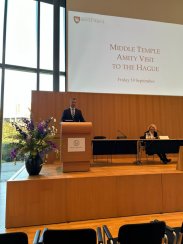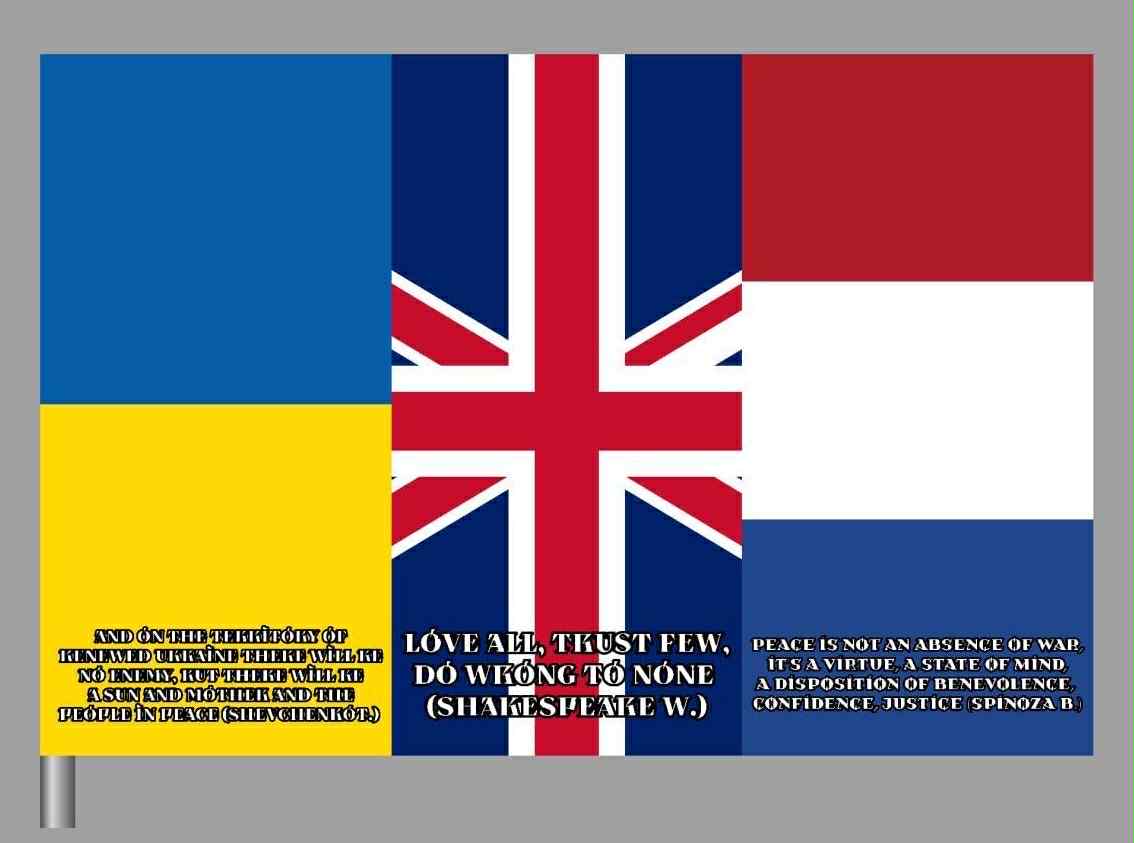Contact center of the Ukrainian Judiciary 044 207-35-46

Judge of the Supreme Court at the Civil Cassation Court, Yevhen Synelnykov, at the invitation of the Treasurer (President) of the Honourable Society of the Middle Temple, The Honourable Judge of the High Court of England and Wales Dame Kathryn Thirlwall, DBE, delivered a report at the conference organised by the Honourable Society of the Middle Temple at the Peace Palace in The Hague (Netherlands).
It should be recalled that The Honourable Society of the Middle Temple is one of the four Inns of Court — professional associations in London that have the exclusive right to call individuals to the Bar of England and Wales. The other three are Inner Temple, Gray's Inn and Lincoln's Inn. The history of Middle Temple dates back to the Middle Ages on land that belonged to the Knights Templar. After the dissolution of the Order, the land was transferred to the crown and subsequently passed to lawyers. Middle Temple has been operating as a legal non-profit corporation since the 14th century. Its main function is to educate and train barristers. Its members include judges, lawyers (solicitors and barristers), academics, and students.
The theme of the first day of the conference, which brought together legal scholars from the United Kingdom and the Netherlands, was “International Law and Its Impact on National Legislation”.
In his report titled “The Administration of Justice under Martial Law,” Yevhen Synelnykov first drew attention to the fact that on 9 July 2025, the European Court of Human Rights (ECtHR) delivered its judgment in the case of “Ukraine and the Netherlands v. Russia” (applications nos. 8019/16, 43800/14, 28525/20, and 11055/22). In this judgment, the Court noted the unprecedented nature of the events taking place in Ukraine and the scale of violence, observing that Europe had long taken for granted Russia’s sinister statements against Ukraine’s statehood, independence, and very right to exist. Similar rhetoric was at times directed at other Council of Europe member states, including Poland, Moldova, and the Baltic countries. Such actions, the Court stressed, undermine the very foundation of democracy on which the Council of Europe and its member states are built — through the destruction of individual freedoms, the suppression of political liberties, and the blatant disregard for the rule of law.
The ECHR pointed to the “flagrant” contempt shown by the aggressor state for the foundations of the international legal order established after the Second World War. It concluded that Russia’s objectives were nothing less than the destruction of Ukraine as an independent sovereign state through the annexation of Ukrainian territory and the subjugation of the remainder of Ukraine to Russian influence and control. These aims are entirely contrary to the Council of Europe’s peace project, founded on democracy, human rights, and the rule of law.

Yevhen Synelnykov informed participants about the principles governing the administration of justice in Ukraine during wartime in accordance with national legislation. These principles stipulate that: justice in territories under martial law is administered exclusively by courts established under the Constitution of Ukraine; no shortening or acceleration of any form of judicial proceedings is permitted; the creation of extraordinary or special courts is prohibited; and so on.
The speaker presented data on the scale of destruction suffered by Ukrainian court buildings. For instance, the premises of the Vuhledar City Court in Donetsk Region were completely destroyed as a result of heavy enemy shelling. During the first attack, a shell hit the second floor of the courthouse, destroying offices, a corridor, and the courtroom. The roof and all windows were shattered, but the first floor — the most modern part thanks to a justice access project implemented in cooperation with the UN Development Programme in Ukraine — remained largely intact.
A subsequent missile strike reduced the courthouse to rubble. Even the surrounding trees were uprooted, and later local residents began burying the dead in the court’s yard.
The judge informed his international colleagues that over €40 million is needed to restore the functioning of courts in these premises, including comprehensive repair works and the procurement of essential equipment and furniture.

Yevhen Synelnykov outlined the main challenges faced by the courts due to the war: forced postponement of hearings because of air raid alerts, lack of electricity, heating, and internet connection; a significant number of case files have been lost and cannot be fully restored due to occupation; suspension of proceedings in cases where one of the parties is a member of the Armed Forces of Ukraine; relocation of judges from occupied territories to other regions, and other difficulties.
The situation is further aggravated by a shortage of personnel. As of today, the judicial system lacks over 2,000 judges. As of 15 September 2025, there were 786 vacant judicial positions in appellate courts (out of a total of 1,357). For example, the Sumy Court of Appeal currently has only 4 judges while 21 positions remain vacant; the Kharkiv Court of Appeal has 12 judges and 48 vacant positions. In first-instance courts, there are 1,315 vacancies. Competitive selection procedures for appointing new judges are currently underway, which may slightly improve the situation.
The digitalisation of justice also contributes to enhancing its effectiveness during martial law. Yevhen Synelnykov informed his European colleagues that Ukraine has implemented a Unified Judicial Information and Telecommunication System, which provides for the automatic allocation of cases, electronic exchange of documents between the court and participants in proceedings, recording of court hearings, and remote participation of parties via videoconference.
In addition, to automate pre-trial investigation processes in corruption-related cases, the eCase system is in operation.

The speaker informed the audience that in April 2025, an updated version of the Supreme Court Legal Positions Database (https://lpd.court.gov.ua) was launched. The new version features an improved search function, a mobile-friendly interface, integration with the Unified State Register of Court Decisions, and built-in generative AI elements.
Digitalisation has significantly facilitated citizens’ access to justice under wartime conditions. However, on 6 June 2025, a technical failure caused serious damage to the Supreme Court’s electronic resources and databases. The software was disabled, and access to electronic services and databases was lost. This resulted in the inability to receive correspondence, send letters, perform automatic case allocation among judges, use electronic signatures, or transmit court decisions. Part of the information stored in the automated document management system for the period from 2 to 5 June was lost. Nevertheless, automatic case allocation was restored on 13 June, and on 20 June, the processing of documents submitted to the Supreme Court through the “Electronic Court” subsystem resumed.
Furthermore, Yevhen Synelnykov explained the essence, reasoning, and grounds for the Supreme Court’s decision on the limited judicial immunity of the aggressor state. Referring to judicial practice, the judge spoke about categories of criminal cases concerning war crimes. In particular, he noted that the Prosecutor General’s Office has recorded over 183,000 war crimes committed in Ukraine.

In most cases of this category, the in absentia procedure is applied. Criminal proceedings for war crimes require mandatory participation of a defence lawyer and are conducted against individuals whose whereabouts are usually unknown, or who are located in the temporarily occupied territories of Ukraine or in the territory of the aggressor state.
The audience warmly received the judge’s presentation and expressed their appreciation with prolonged standing applause.
At the event, a keynote address titled “The Status and Functioning of the International Court of Justice” was delivered by Sir Christopher Greenwood, King’s Counsel, Judge of the International Court of Justice (2009–2018), and Professor of International Law. Professor Larissa van den Herik and Professor Philippe Sands, KC, barrister, shared insights on jurisdictional issues before the International Court of Justice. Professor Martin Kuijer, Judge of the Supreme Court of the Netherlands and member of the Venice Commission, addressed challenges related to upholding the rule of law. Judge Jessica Simor of the Court of Appeal of The Hague, in her presentation “The Development of Environmental Law”, emphasised states’ obligations under international law to ensure environmental protection. Judge Kees Klomp and barrister Ben Douglas-Jones discussed measures to combat human exploitation, focusing on the identification and prosecution of perpetrators. Barristers Derrick Dale and Marie Demetriou presented papers on sanctions against the Russian Federation and its agents, highlighting relevant case law, including the UK Supreme Court’s decision concerning the British government’s 2022 sanctions and asset freeze imposed on Russian billionaire Eugene Shvidler. Eleanor Sharpston, Advocate General at the Court of Justice of the European Union (2006–2020), in her lecture on freedom of expression, used her own example of wearing a blue-and-yellow bracelet to illustrate the limits of exercising free speech in different countries.
Colleagues from the United Kingdom — including judges of the High Court of England and Wales David Bean, Kathryn Thirlwall, Clive Lewis, Judith Farbey, Jonathan Baker, Martin Chamberlain, and barristers Fergus Randolph, Suzanne Ornsby, Ben Douglas-Jones, and Derrick Dale — as well as from the Netherlands, including judges Martin Kuijer and Kees Klomp, expressed their unequivocal and heartfelt support for representatives of the Ukrainian legal profession and for Ukraine as a whole. They emphasised the importance of Ukraine’s integration into the European Union and the need to take steps to make EU law accessible to Ukrainian judges and lawyers.

Following the event, the Treasurer (President) of the Honourable Society of the Middle Temple, Dame Kathryn Thirlwall, sent a letter in which she sincerely thanked Yevhen Synelnykov on her own behalf and on behalf of the Middle Temple for his important and moving presentation, expressing admiration for the courage of Ukrainian judges who continue to administer justice under the most difficult circumstances. The Treasurer of the Middle Temple also informed that several conference participants expressed a desire to assist Ukraine and to share their ideas and proposals within the legal sphere.
It should be recalled that Yevhen Synelnykov had previously delivered a lecture before the audience of the Honourable Society of the Middle Temple at Middle Temple Hall in London. As noted by the Society, that presentation was highly successful and received excellent feedback from London colleagues (https://supreme.court.gov.ua/supreme/pres-centr/news/1811630/).
Presentation by Yevhen Synelnykov – https://court.gov.ua/storage/portal/supreme/prezentacii_2025/The_Operation_of_Justice_Under_Martial_Law_.pdf.
News about the event on the website of the Honourable Society of the Middle Temple: https://www.middletemple.org.uk/news/amity-visit-hague .